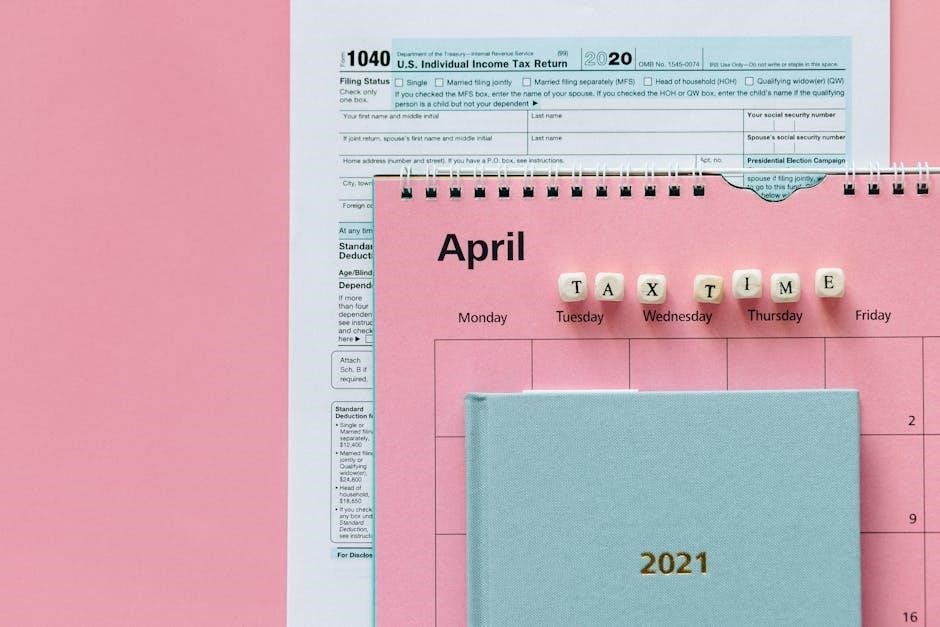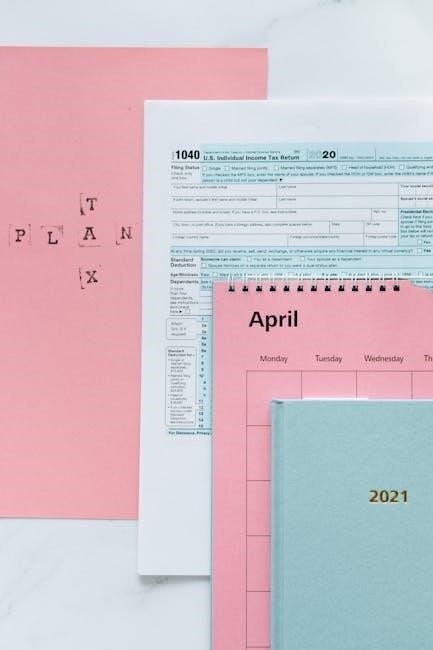Applying for Sixth Form in 2024 requires careful planning and attention to deadlines. Submitting applications and required documents on time is crucial to secure a place. Deadlines‚ entry requirements‚ and open events are key considerations for a smooth transition. Organize your application process early to avoid last-minute stress and ensure all steps are completed efficiently.
1.1 Overview of Sixth Form Education in the UK
Sixth Form education in the UK is a two-year program for students aged 16-18‚ typically leading to A-Level qualifications. It bridges GCSEs and higher education‚ offering academic and vocational pathways. Students choose subjects aligning with their career goals‚ with many aiming for university entry. The curriculum emphasizes depth and specialization‚ preparing learners for independent study. Sixth Forms are available in schools‚ colleges‚ and academies‚ providing a supportive environment for academic growth and personal development. This phase is crucial for shaping future opportunities and career prospects.
1.2 Importance of Meeting Deadlines
Meeting the Sixth Form application deadline is crucial to secure a place at your chosen institution. Late submissions often result in reduced course availability or even rejection. The deadline for 2024 applications is 31 January 2024‚ and missing this can limit options. Early preparation ensures all required documents are submitted on time‚ avoiding last-minute complications. By adhering to deadlines‚ students demonstrate responsibility and commitment‚ which are essential for a successful Sixth Form experience. Plan ahead to avoid missing out on opportunities and ensure a smooth transition to post-16 education.

Key Dates for Sixth Form Applications 2024
The Sixth Form application deadline for 2024 is 31 January 2024. Open evenings‚ such as those on 17 October 2024‚ provide essential insights for applicants. Plan accordingly to meet these key dates and ensure a smooth application process.
2.1 Sixth Form Application Deadline 2024
The deadline for submitting Sixth Form applications for 2024 is 31 January 2024. This applies to all applicants‚ including international students. Meeting this deadline is crucial to secure a place‚ as late applications may not be accepted. Open evenings‚ such as the one on 17 October 2024‚ offer valuable insights and opportunities to ask questions. Ensure all required documents are submitted by the deadline to avoid delays. Planning ahead and attending open events can help streamline the application process and improve your chances of a successful outcome.
2.2 Open Evening Dates for Prospective Students
Key open evening dates for prospective Sixth Form students include 28 September 2023 and 5 October 2023‚ both scheduled from 5:30 PM to 8:00 PM. These events provide an excellent opportunity to explore facilities‚ meet teachers‚ and gain insights into course offerings. Attendees can also ask questions about the application process and entry requirements. Registration for these events is available on the school’s admissions website. Attending open evenings is a crucial step in making informed decisions about your Sixth Form education and ensuring a smooth transition.

The Application Process
The Sixth Form application process for 2024 involves submitting required documents by the deadline‚ with options to apply online or via email. Ensure timely submission to secure your place.
3.1 How to Apply for Sixth Form
To apply for Sixth Form in 2024‚ students can submit their applications online or via email to the Admissions Department. The process typically involves completing an application form‚ uploading required documents such as GCSE results‚ a personal statement‚ and a teacher reference. Ensure all materials are submitted by the deadline to avoid delays. Online applications are often preferred for faster processing‚ while email submissions must include all necessary attachments. Double-check the application for accuracy before submission to ensure a smooth review process.
3.2 Required Documents for Submission
When applying for Sixth Form‚ students must submit specific documents to complete their application. These typically include GCSE results‚ a personal statement‚ and a teacher reference. Additional requirements may include proof of residency‚ identification‚ and any subject-specific documents. Ensure all files are in the correct format and uploaded or emailed by the deadline. Incomplete applications may not be processed‚ so double-check that all required documents are included. Organize your materials in advance to avoid last-minute issues and ensure a smooth application process.
3.3 Submission Methods (Online/Email)
Applications for Sixth Form can be submitted online through the school’s portal or via email to the Admissions Department. Ensure all required documents are attached and clearly labeled. Online submissions are preferred for faster processing‚ but email applications are also accepted. The deadline for submission is 31 January 2024. Late submissions may not be accepted‚ so verify the method and timeline in advance. Double-check your application for completeness before sending to avoid delays in processing.

Entry Requirements
Entry requirements for Sixth Form typically include a minimum of three grade 7s and two grade 6s at GCSE. Specific subjects may have higher grade requirements.
4.1 Academic Requirements for Sixth Form
Academic requirements for Sixth Form typically include achieving a minimum of three grade 7s and two grade 6s at GCSE. However‚ certain subjects may require higher grades. Students should check specific school policies‚ as requirements can vary. Meeting these standards ensures eligibility for A-Level courses. It’s essential to review entry criteria early to align academic goals with Sixth Form expectations. Strong performance in relevant subjects is often necessary for competitive programs. Planning and achieving these grades helps secure a smooth transition to post-16 education.
4.2 Subject-Specific Entry Requirements
Certain subjects may have higher entry requirements due to their academic demands. For example‚ Mathematics and Sciences often require a grade 7 or above at GCSE. Similarly‚ Modern Languages may demand a grade 6 or higher. Students should review the specific criteria for their chosen subjects‚ as requirements can vary between schools. Meeting these standards ensures eligibility for A-Level courses. It’s crucial to align academic performance with subject-specific expectations to secure a place in desired programs. Early planning helps students achieve the necessary grades for their chosen pathways.

Sixth Form Open Events
Open events provide valuable insights into courses‚ facilities‚ and school culture. Attendees can meet teachers‚ discuss subject options‚ and gain a sense of community. Key dates include 17 October 2024 and 28 September 2023‚ offering opportunities to explore and ask questions‚ helping students make informed decisions about their academic path.
5.1 Benefits of Attending Open Events
Attending open events offers students and parents a chance to explore schools‚ meet teachers‚ and understand course offerings. These events provide insights into school culture‚ facilities‚ and extracurricular opportunities. Students can ask questions about subject choices‚ entry requirements‚ and support services. Open events also help students gauge whether a school aligns with their academic and personal goals. By attending‚ students can make informed decisions about their sixth form applications‚ ensuring they choose the right environment for their future success.
5.2 Key Dates for Open Evenings
Open evenings for sixth form applications in 2024 are scheduled on 28 September and 5 October 2023‚ with additional events on 17 October 2024. These events provide opportunities to meet teachers‚ tour facilities‚ and gain insights into course offerings. Prospective students can register for these events through the school’s admissions website. Attending open evenings helps students make informed decisions about their academic path. Mark these dates to ensure you don’t miss the chance to explore your options and prepare for the 31 January 2024 application deadline.
Late Applications and What to Do
Missing the 31 January 2024 deadline may limit your options‚ but some schools reopen applications later. Contact the admissions team promptly for guidance on late submissions.
6.1 Consequences of Missing the Deadline
Missing the 31 January 2024 deadline can reduce your chances of securing a place at your preferred school. Many institutions prioritize timely applicants‚ leaving late applicants with limited course availability. Some schools may reopen applications later‚ but options are often restricted. Late submissions can also delay enrollment and may require additional steps to secure a spot. It’s crucial to contact the admissions team promptly if you’ve missed the deadline to explore possible solutions and avoid further complications in the application process.
6.2 Options for Late Applications
If you miss the 31 January 2024 deadline‚ contact the admissions team immediately to discuss possible late application options. Some schools may still accept applications‚ though course availability could be limited. Attending open events or speaking with advisors can help explore remaining opportunities. In some cases‚ schools may reopen applications later‚ but this is not guaranteed. Late applicants are encouraged to act quickly and remain flexible‚ as options may be restricted. Prompt communication with the admissions team is key to securing a potential spot.

International Student Applications
The 31 January 2024 deadline applies to international students‚ with additional requirements such as proof of English proficiency and visa documentation. Open evenings are beneficial for insights.
7.1 Deadlines for International Students
International students must adhere to the same 31 January 2024 deadline as UK applicants for Sixth Form applications. Open evenings‚ such as the one on 17 October 2024‚ provide valuable insights and opportunities to ask questions. International applicants should ensure all required documents‚ including proof of English proficiency and visa eligibility‚ are submitted on time. Late applications may be considered‚ but securing a place is not guaranteed. Organizing documents early and attending open events can help streamline the process and ensure compliance with all requirements.
7.2 Additional Requirements for International Applicants
International applicants must provide proof of English proficiency‚ such as IELTS or GCSE English qualifications‚ alongside academic transcripts. Visa eligibility documents and a valid passport are also required. Academic requirements include a minimum of three grade 7s and two grade 6s at GCSE‚ with specific subjects potentially requiring higher grades. All documents must be submitted to the Admissions Department by the deadline to ensure timely processing. International students should also research visa application timelines to avoid delays in the enrollment process.
Receiving Offers and Next Steps
After receiving an offer‚ review the terms and respond by the deadline. Prepare for enrolment and induction‚ ensuring all documents are ready for a smooth transition.
8.1 Understanding Offer Letters
An offer letter outlines the terms of your Sixth Form place‚ including the deadline to respond and any conditions‚ such as achieving specific grades. Review it carefully to ensure all details align with your plans. The deadline for acceptance is typically soon after receiving the offer. If you meet the conditions by the deadline‚ your place is confirmed. Offers may also include subject-specific requirements or induction details. Respond promptly to secure your spot‚ and keep the letter for future reference.
8.2 What to Do After Receiving an Offer
After receiving a Sixth Form offer‚ carefully review the letter to understand the terms and conditions. Ensure you meet any academic or subject-specific requirements by the specified deadline. Confirm your acceptance promptly‚ as delays may affect your place. Prepare for induction by gathering necessary documents and attending any pre-enrollment events. Stay organized by keeping the offer letter safe and noting key dates. If you have questions‚ contact the admissions team for clarification. Securing your spot early ensures a smooth transition to Sixth Form.

Preparing for Sixth Form
Organize your documents‚ review entry requirements‚ and stay updated on key dates to ensure a smooth transition. Plan ahead to meet all necessary deadlines efficiently;
9.1 Tips for a Smooth Transition
Stay organized by tracking deadlines and requirements for your Sixth Form application. Research the entry criteria and attend open events to gain insights. Prepare necessary documents early‚ such as GCSE results and references. Seek advice from teachers or mentors to make informed subject choices. Familiarize yourself with the application process and submission methods. Plan your time effectively to avoid last-minute stress. Regularly check for updates on key dates and admission procedures to ensure a seamless transition to Sixth Form.
9.2 Induction Processes and Expectations
Induction processes typically begin with orientation events‚ introducing students to teachers‚ facilities‚ and classmates. Expect to receive detailed timetables and course outlines. Familiarize yourself with school policies and expectations. Engage in icebreaker activities to build relationships. Academic advisors will guide you through subject choices and study strategies; Be prepared for introductory sessions on independent learning and time management. Understanding the induction process helps you adapt smoothly to Sixth Form life‚ ensuring you are well-prepared for the academic and social challenges ahead.

Financial Support and Scholarships
Scholarships and bursaries are available to support Sixth Form students financially. Eligibility criteria vary‚ with some awards based on academic merit or financial need. Apply early to secure funding.
10.1 Available Scholarships for Sixth Form Students
Various scholarships are available for Sixth Form students‚ including academic merit-based awards and financial need-based bursaries. Eligibility criteria vary‚ with some requiring specific GCSE grades or extracurricular achievements. Schools often offer dedicated scholarships to support students pursuing A-Levels or vocational courses. Additionally‚ pupil premium and service pupil support may be available for eligible students. Applying early is crucial‚ as funding opportunities can be limited. Check with your chosen institution for detailed eligibility criteria and application deadlines to secure financial assistance for your Sixth Form studies.
10.2 Bursaries and Financial Assistance
Bursaries and financial assistance are available to support Sixth Form students with education-related expenses. These funds often target students from low-income backgrounds or those eligible for pupil premium. Service pupil support may also be available for eligible students. Financial assistance is typically allocated based on household income and specific criteria. Applications for bursaries should be submitted alongside Sixth Form applications to ensure timely processing. Schools may also offer additional support for students facing financial hardships‚ helping to ensure equal access to Sixth Form education.

Post-Application Guidance
After submitting your Sixth Form application‚ track your status‚ prepare for interviews‚ and review offer letters carefully. Stay informed about enrolment timelines and next steps to ensure a smooth transition.
11.1 Accepting or Declining Offers
Once you receive an offer‚ carefully review the terms and respond by the specified deadline‚ typically within a few weeks. Accepting secures your place‚ while declining allows others to fill the spot. Missing the deadline may result in losing your offer. If declining‚ notify the school promptly to explore alternative options. Ensure you understand the implications of your decision‚ as it impacts your academic pathway. Seek guidance if unsure to make an informed choice that aligns with your goals.
11.2 Enrolment Process and Timeline
The enrolment process typically begins shortly after offer acceptance‚ with key dates provided by the school. Students must submit any outstanding documents and complete enrolment forms by the specified deadline‚ usually in late summer. Induction sessions are often scheduled before the start of term to familiarize students with the school and curriculum. The academic year for Sixth Form usually commences in early September. Ensure all steps are completed promptly to secure your place and prepare for a smooth transition to Sixth Form studies.

Frequently Asked Questions
Common questions include deadlines‚ required documents‚ and consequences of late submissions. Understanding these ensures a smooth application process and avoids potential issues. Plan accordingly for success.
12.1 Common Concerns About Deadlines
Many students worry about meeting the Sixth Form application deadline of 31 January 2024. Missing this date can limit options‚ so it’s crucial to submit applications and documents on time. Common concerns include understanding entry requirements‚ such as grade 7s and 6s at GCSE‚ and ensuring all paperwork is complete. International students often ask about additional deadlines and requirements. Checking specific school guidelines and attending open events can help address these concerns and ensure a smooth application process. Planning ahead is key to avoiding last-minute stress and securing a place.
12.2 Changing Schools After Application
Changing schools after submitting a Sixth Form application is possible but requires careful consideration. Students must inform both their current and desired schools promptly. This ensures a smooth transition and avoids complications with deadlines. If moving schools after the deadline‚ applicants should check if places are still available. Some schools may accommodate late changes‚ while others may not. It’s essential to research the new school’s policies and deadlines to ensure a seamless transition. Planning ahead and communicating clearly with both institutions is crucial for a successful change.
Meeting the Sixth Form application deadline is crucial for a smooth transition. Stay organized‚ submit documents on time‚ and plan carefully to secure your place successfully.
13.1 Final Tips for a Successful Application
Research schools thoroughly and ensure they align with your academic and career goals. Verify entry requirements and deadlines to avoid missing crucial dates. Prepare all documents‚ such as GCSE results and references‚ well in advance. Attend open events to gain insights and ask questions. Submit applications early to avoid technical issues. Double-check all details before submission. Seek guidance from teachers or advisors if needed. Stay organized and keep track of deadlines to ensure a smooth application process.
13.2 Staying Organized for Key Dates
Staying organized is essential for meeting the Sixth Form application deadline of 31 January 2024. Create a digital or physical calendar marking key dates‚ such as open evenings in September and October 2023. Set reminders for document submissions and deadlines to avoid last-minute rushes. Prioritize tasks like researching schools‚ gathering documents‚ and drafting personal statements. Regularly check your email for updates and confirmations. Missing deadlines can limit options‚ so stay proactive and maintain a checklist to track progress. Early preparation ensures a stress-free application process.

